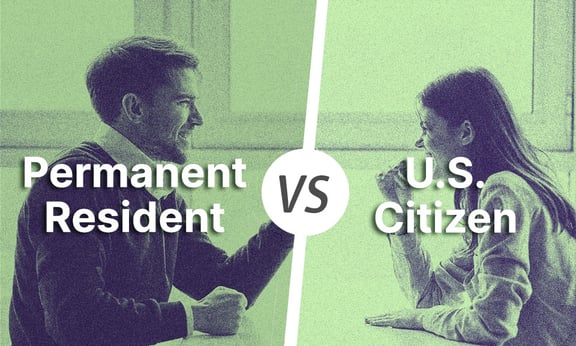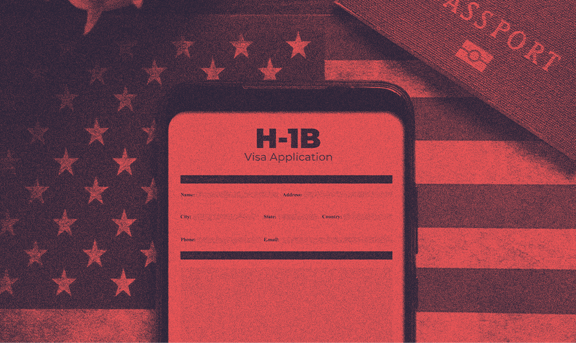For many professionals working in the United States under H-1B or other work visas, being able to bring family members is one of the most important aspects of building a life abroad. The H-4 visa exists for exactly this purpose—it allows spouses and unmarried children under 21 of H-visa holders to live legally in the U.S., and in some cases, to study or even work.
At Grape Law, we frequently assist families navigating the H-4 process, helping them maintain lawful status while planning for education, career development, and future Green Card opportunities.
Understanding the H-4 Visa
The H-4 visa is a dependent, nonimmigrant visa available to the immediate family members of H-visa holders—typically those in H-1B, H-2A, H-2B, or H-3 categories. Most H-4 dependents accompany H-1B professionals employed in specialized fields that require advanced degrees or expertise.
Unlike H-1B holders, who are tied to specific employers and job roles, H-4 visa holders do not have work-based obligations. Their legal status, however, fully depends on the validity of the principal visa holder’s status. When the H-1B or other primary visa expires or is revoked, the H-4 dependent’s status ends automatically as well.
The visa was designed primarily to support family unity, but its significance has grown—especially since certain H-4 spouses were granted employment authorization rights.
Eligibility and Application Process
To qualify for an H-4 visa, an applicant must be the lawful spouse or an unmarried child under the age of 21 of a valid H-visa holder. Proof of this relationship—such as a marriage certificate for spouses or birth certificate for children—is essential.
Applicants can apply for the H-4 visa either from outside the U.S. through consular processing or, if already present in the country on another visa, through a change of status with Form I-539. Those applying abroad must complete Form DS-160, schedule an interview at a U.S. embassy or consulate, and present key documents including the principal visa holder’s approval notice, evidence of family relationship, and proof of financial support.
Accuracy in documentation and consistency with the principal applicant’s details are crucial to avoid delays or denials.
Work and Education Opportunities
One of the most common questions we receive is whether H-4 visa holders can work in the United States. The answer depends on the H-1B visa holder’s progress toward permanent residency.
H-4 spouses are eligible to apply for work authorization only if the principal H-1B holder has an approved Form I-140 (Immigrant Petition for Alien Worker) or has received an extension beyond the six-year H-1B limit under the American Competitiveness in the Twenty-First Century Act (AC21). If either condition is met, the H-4 spouse can file Form I-765 (Application for Employment Authorization). Once approved, they can work for any employer in any occupation, without restriction.
Introduced in 2015, this regulation represented a significant step toward supporting dual-career families in the U.S. While the rule has faced occasional political scrutiny, it remains active and continues to offer valuable flexibility for H-4 dependents.
H-4 holders are also permitted to study in the U.S. at any level—elementary, secondary, or post-secondary—without needing an additional F-1 student visa. This allows children to continue their education seamlessly and gives spouses the opportunity to pursue further studies, enhance qualifications, or prepare for future employment once work authorization is granted.
Travel, Status Maintenance, and Long-Term Options
H-4 visa holders may travel internationally, but their re-entry to the U.S. depends on both their own visa validity and the principal visa holder’s continued lawful status. When traveling abroad, it’s vital to carry a valid H-4 visa stamp, the principal’s latest H-1B approval notice, and employment verification letters. If the principal visa holder changes employers or status while the dependent is abroad, re-entry can become complicated, so advance legal guidance is strongly recommended.
Although the H-4 visa itself does not lead directly to permanent residence, it is often part of a broader immigration journey. When the principal H-1B visa holder begins the Green Card process through employment—such as under the EB-2 or EB-3 categories—H-4 dependents are included as derivative beneficiaries. This means spouses and children can eventually obtain Green Cards alongside the principal applicant once the full process, including PERM, I-140, and Adjustment of Status, is completed.
Still, the H-4 visa comes with challenges: long processing times, particularly for work authorization renewals; lack of automatic employment eligibility; and the “aging-out” issue for children who turn 21 before the Green Card process concludes. Proactive legal planning helps minimize these risks and ensures status continuity for every family member.
Maintaining lawful status and family unity in the U.S. requires careful timing, accurate filings, and a clear understanding of changing immigration policies. Each step—from visa issuance to work authorization—plays a vital role in ensuring long-term security.
At Grape Law, we help families manage every aspect of the H-4 journey. From preparing initial visa applications to handling employment authorization, educational planning, and transition to permanent residency, our attorneys ensure every case is built with foresight and precision.
📩 For personalized assistance with your H-4 visa or dependent status, contact us at info@grapelaw.com.
With a 97% approval rate and deep expertise in employment-based immigration, we’re here to help your family build a stable, confident future in the United States.
Categories











